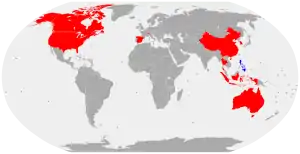Extradition law in the Philippines
Extradition in the Philippines may come into effect when the Philippine government and an international government sign an agreement through a treaty to be ratified by their respective implementing bodies.

Countries (in red) that have signed extradition treaties or Transfer of Sentenced Persons agreement with the Philippines (in blue)
Countries
Extradition in force
These are countries that have signed extradition treaties to the Philippines and have taken effect by ratification:[1]
| Country | Transfer of Sentenced Persons Agreement (TSPA) | Extradition agreement | Date Treaty Signed (TSPA) | Date Treaty Ratified (TSPA) | Date Treaty Signed (Extradition) | Date Treaty Ratified (Extradition) |
|---|---|---|---|---|---|---|
- |
- |
March 7, 1988 | January 18, 1991 | |||
- |
- |
November 7, 1989 | November 12, 1990 | |||
- |
- |
October 30, 2001 | April 11, 2006 | |||
| April 28, 2000 | June 15, 2002 | January 30, 1995 | June 20, 1997 | |||
- |
- |
March 12, 2004 | October 12, 2015 | |||
- |
- |
February 10, 1976 | October 25, 1976 | |||
| May 18, 2007 | December 28, 2007 | March 2, 2004 | April 24, 2014 | |||
| October 12, 2001 | May 7, 2002 | March 16, 1981 | December 7, 1984 | |||
- |
- |
November 13, 2017[2] | December 18, 2019[2] | |||
- |
- |
May 25, 1993 | November 30, 1996 | |||
- |
- |
October 19, 1989 | February 23, 1997 | |||
- |
- |
September 18, 2009 | April 14, 2014 | |||
- |
- |
November 13, 1994 | November 22, 1996 |
See also
External links
References
- Cruz-Paredes, Millicent. "FOI Request for the Number of Extradition Treaties the Philippines has with other countries" (PDF). Electronic Freedom of Information. Department of Foreign Affairs. Retrieved 8 June 2019.
- http://senate.gov.ph/lis/bill_res.aspx?congress=18&q=SRN-263
- https://www.dfa.gov.ph/index.php/2013-06-27-21-50-36/dfa-releases/465-philippines-viet-nam-hold-bilateral-talks
- https://www.senate.gov.ph/press_release/2014/0304_santiago1.asp
This article is issued from Wikipedia. The text is licensed under Creative Commons - Attribution - Sharealike. Additional terms may apply for the media files.